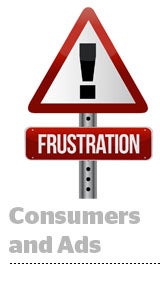 The balance between protecting consumers’ privacy and reaching them with relevant targeted ads is a constant struggle for the online ad industry. And consumers experience a similar tension, according to several surveys published in recent months.
The balance between protecting consumers’ privacy and reaching them with relevant targeted ads is a constant struggle for the online ad industry. And consumers experience a similar tension, according to several surveys published in recent months.
After a December 2012 survey of 2,000 customers in the US and UK, Accenture Interactive found that 86% of respondents said they were worried about websites tracking their actions, but 85% also said they understood it is a necessary tactic to properly target consumers.
There’s no doubt that advertising online can be frustrating for consumers. In late February 2013, InsightsOne’s 2013 Bad Ads Survey, conducted by Harris Interactive, found that 91% of consumers reported seeing an annoying ad with irrelevant pop-ups – lottery scams and male enhancement ads as the most annoying.
“A lot of the impressions we’re making on the customer may have a detrimental impact on the relationship with that customer,” said Bob Dutcher, VP of marketing for InsightsOne. “In the age of social media, Facebook and Twitter, a lot of consumers are willing to give a little more information if it results in a better experience. The frustration is, and where marketers and companies can get in trouble, if they are leveraging that information but not giving something back to the consumer, not giving them a better experience. It has to be a two-way relationship.”
The Digital Advertising Alliance, in conjunction with Zogby Analytics, found this to be true in an April 2013 survey: a majority of US consumers (75.4%) would rather see ads in order to get free content online, while only 9.3% would prefer to pay for ad-free content.
And respondents also reported that they favored relevant, targeted ads with 40.5%, saying they’d rather see ads directed at their interests. An additional 27.6% said they would like to see both targeted and random ads.
The DAA also found that 75.3% of respondents said they should be the ones making the decisions when it comes to what ads they see and how they are generated; 47.3% said they would not support a law that restricted how data is used in internet advertising. That question also included the phrase “but also potentially reduced the availability of free content like blogs and video sites online,” which may have impacted some of the responses.
The DAA is, of course, a major player in the self-regulatory process for online advertising, and in an obvious dig at Mozilla Firefox asked its survey respondents, “If a major internet browser makes it harder for companies to display advertising to users, what do you think will be the impact on your user experience?” In response, 41.1% said they will see less free content online, while 27.8% said it will have no effect, and 22.4% were not sure.
Only 12.3% of respondents said their biggest concern with the internet is government surveillance of data, while 38.7% were concerned with identity theft and 33.5% were worried about viruses and malware. A full 61.5% of respondents said they do not trust the government to regulate internet advertising.
Enliken, a start-up that allows consumers to control their online data and sell it to advertisers, found that consumers feel more comfortable sharing certain categories of information with advertisers.
Its recent Data Accuracy Study found that respondents deemed categories such as political leanings, financial information and health issues as “sensitive information,” while the technology they use, entertainment they prefer and news they watch were less sensitive tidbits and therefore okay for marketers to use for targeted advertising. Shopping and intent data were also less sensitive, said Marc Guldimann, CEO of Enliken, and that is the information advertisers really want and need.
“Information that advertisers want and the information that you consider sensitive rarely overlaps,” he added. “The main takeaway is that not all data is bad. Not all data is sensitive. You can safely use data as a marketer and not worry about violating your customers’ privacy.” The study created an interactive chart demonstrating where certain categories fall regarding sensitivity.
Wealth data and information naturally fall into the sensitive category, and December 2012 data from the Luxury Institute backs that up. The survey found that affluent consumers are more concerned about online privacy, and of those consumers who have a minimum annual income of $150,000, 63% would prefer to opt out of online targeting.
Many respondents (68%) said they are okay with providing personal information to online retailers in order to make a purchase, but 60% said that once they do provide their information, they feel as if they have no control over it.
Consumer attitudes and thoughts on online advertising and data tracking are mixed. Many understand the benefits but do not know how to calm their fears of tracking and of a Big Brother knowing too much. The BBC recently asked several students their thoughts on targeted online advertising, and one reader summed it up nicely: “Most of the content that you access online is free because of advertising. But I think the price you’re paying for the content is too high because it’s way too invasive.”











